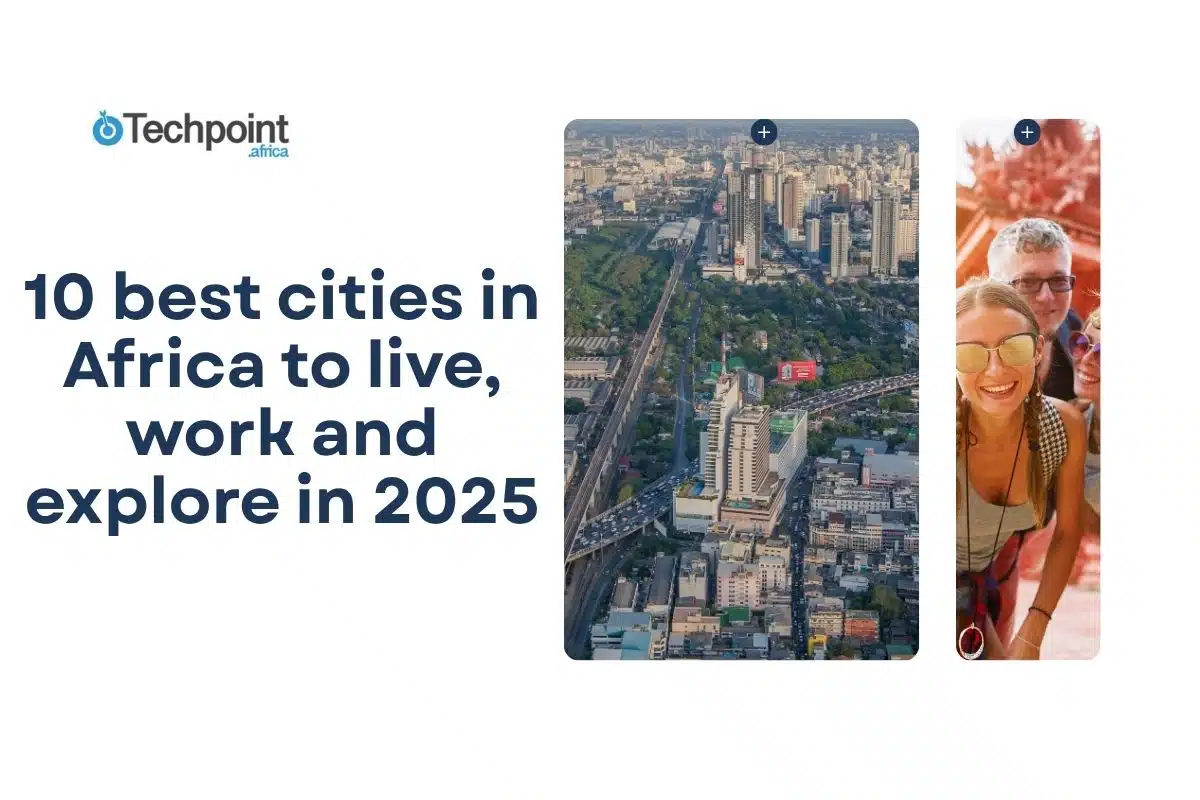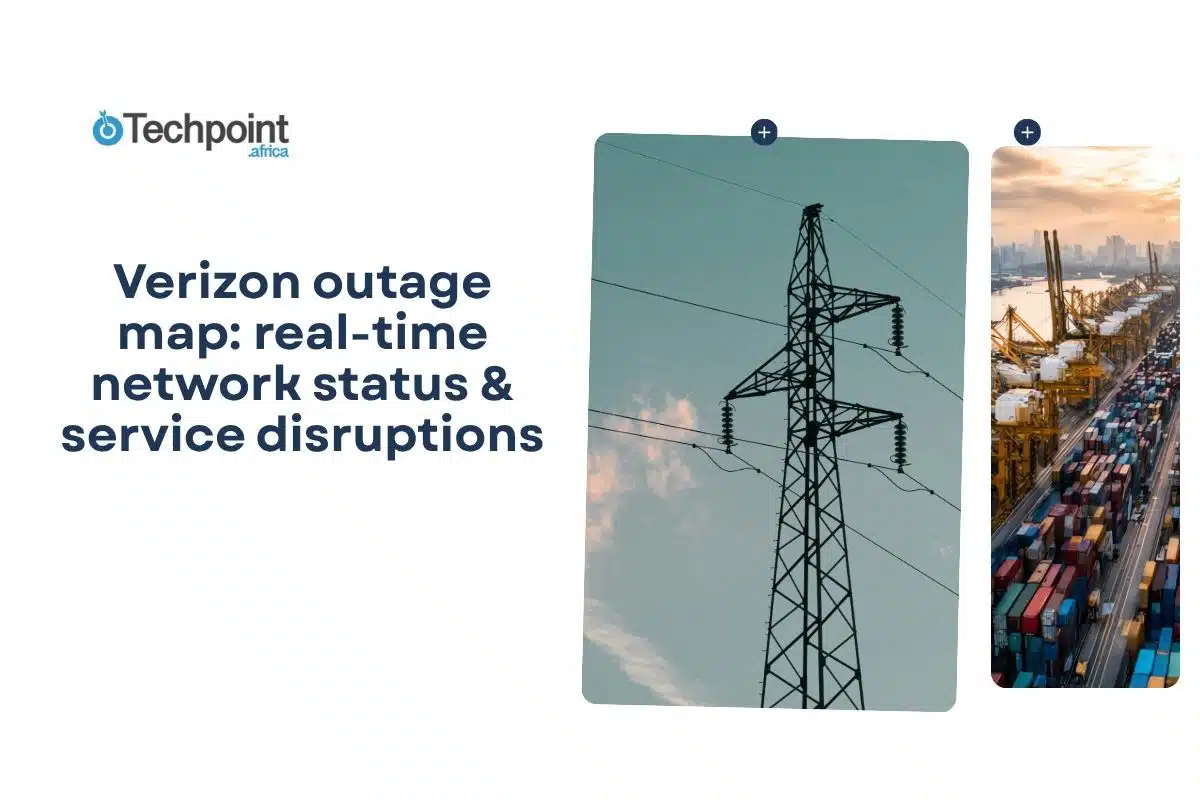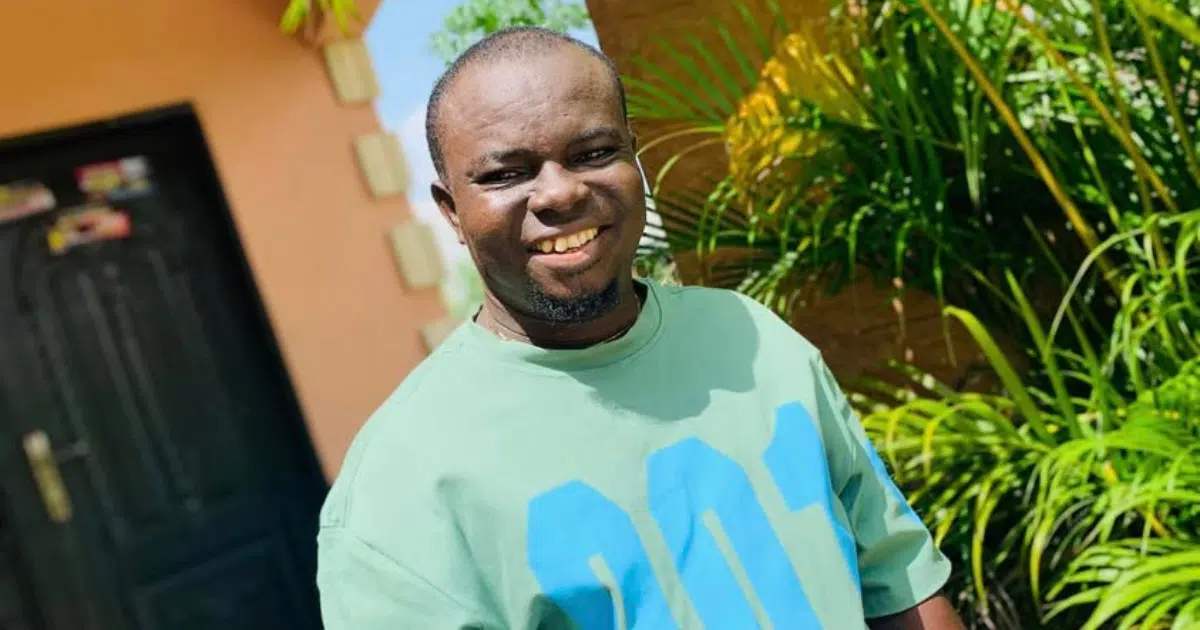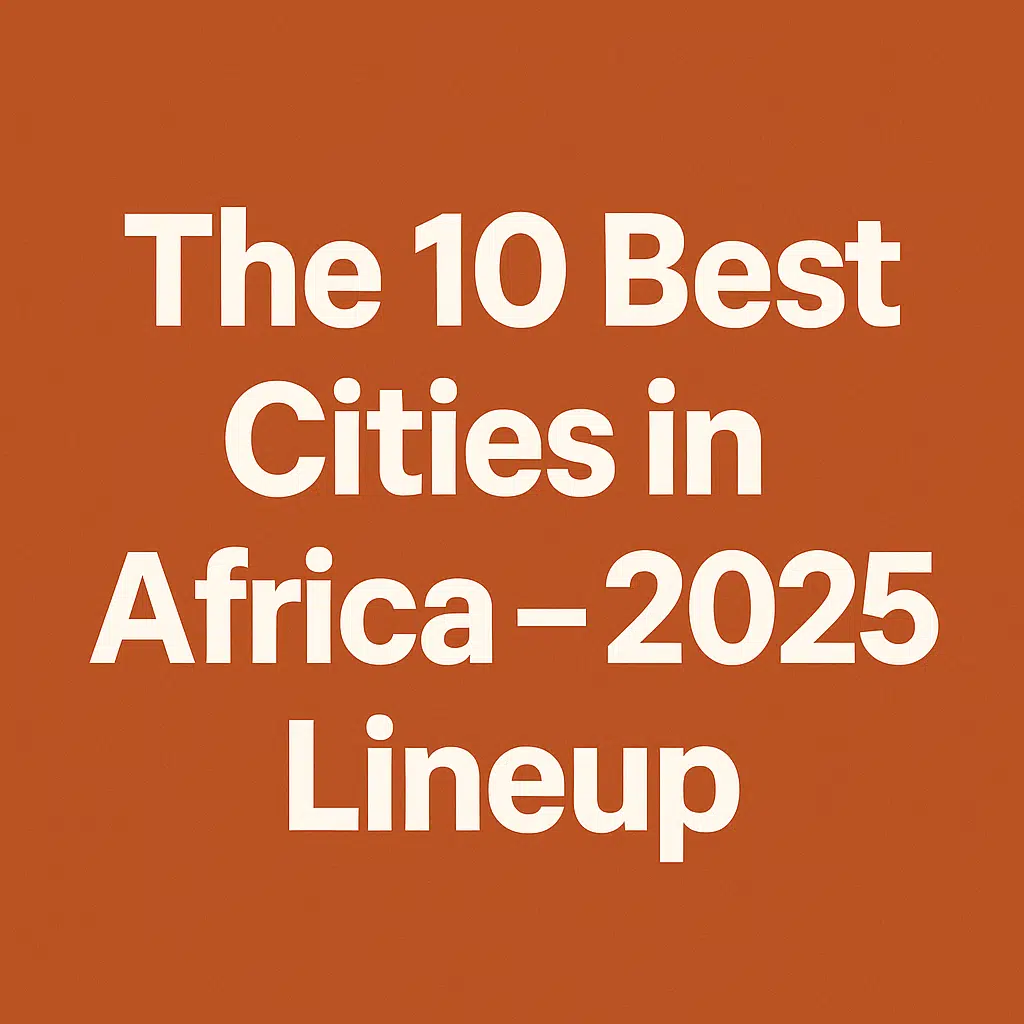
Africa is home to some of the world’s most dynamic, beautiful, and fast-evolving cities. From tech-driven capitals to laid-back coastal gems, these destinations offer more than just a place to stay.
Each city featured here stands out for something unique, be it innovation, culture, quality of life, or sheer energy. This isn’t just a ranking, it’s your top guide to where Africa’s future is being lived right now.
From coastal capitals to high-altitude tech hubs, these cities are shaping modern Africa in bold and exciting ways.
Let’s take a tour!
The 10 best cities in Africa — 2025 lineup
This list brings together ten urban centers that are making waves in 2025. Some are booming tech hubs, others are cultural capitals or lifestyle havens. What they share is a growing reputation for excellence, whether in innovation, livability, or creative expression.
Here’s a quick look at who made the list and what they’re best known for:
- Cape Town, South Africa: Best for Lifestyle & Scenery
- Lagos, Nigeria: Best for Business & Hustle Culture
- Kigali, Rwanda: Best for Cleanliness & Safety
- Marrakech, Morocco: Best for History & Design
- Nairobi, Kenya: Best for Tech & Wildlife Fusion
- Accra, Ghana: Best for Culture & Afrobeat Vibes
- Cairo, Egypt: Best for Heritage & Urban living.
- Dakar, Senegal: Best for Art & Coastal Cool.
- Addis Ababa, Ethiopia: Best for Pan-African Spirit.
- Port Louis, Mauritius: Best for Remote Work & Luxury Living
Now let’s take a closer look at what makes each city worth your attention. Starting with Cape Town.
1. Cape Town, South Africa
Best for Lifestyle & Scenery
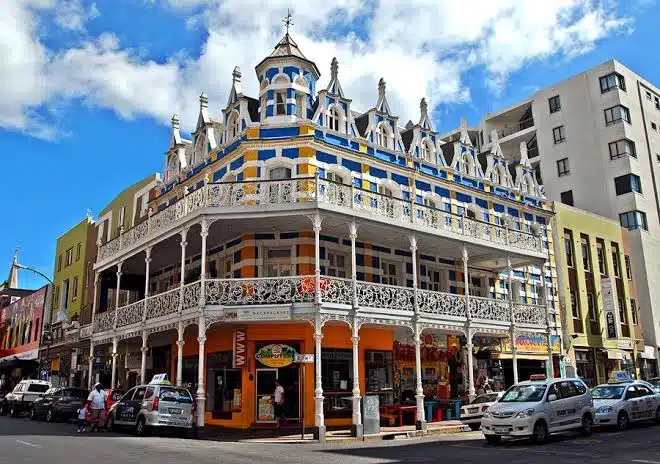
Cape Town is one of South Africa’s three capitals (the legislative one) and is home to 5.06 million people in its metro area. Known for its iconic Table Mountain, it also functions as a major economic hub in the Western Cape, particularly for tourism, agriculture, and tech.
Cape Town ranks high in livability for African cities, largely thanks to its natural geography and urban design.
- Transport: While there’s no metro rail like in some cities, the MyCiTi Bus system is efficient and reliable for key routes.
- Healthcare: Home to top-tier private hospitals and the historic Groote Schuur Hospital, where the first heart transplant took place.
- Education: Includes the University of Cape Town (UCT), ranked as Africa’s best university by multiple global indexes.
- Safety: Crime is a major concern in certain areas. Gated communities and security infrastructure are common among middle and upper-class residents.
Neighborhoods & Cost of Living
Cape Town offers a wide cost spectrum.
- City Bowl & Atlantic Seaboard: High rents, expat-heavy, walkable.
- Southern Suburbs: Popular with families and students.
- Townships: Like Khayelitsha, where many residents still face infrastructural challenges.
Monthly costs for a single person range from $900 to $1,800, depending on lifestyle. High-speed internet is widely available, and Cape Town is increasingly popular with digital nomads and remote teams.
Fun Fact
Cape Town was the first city in the world to run the risk of completely running out of water in 2018. It was called “Day Zero.” The city responded with major water-saving efforts, and today it’s a global case study in urban water resilience.
2. Lagos, Nigeria
Best for Business & Hustle Culture
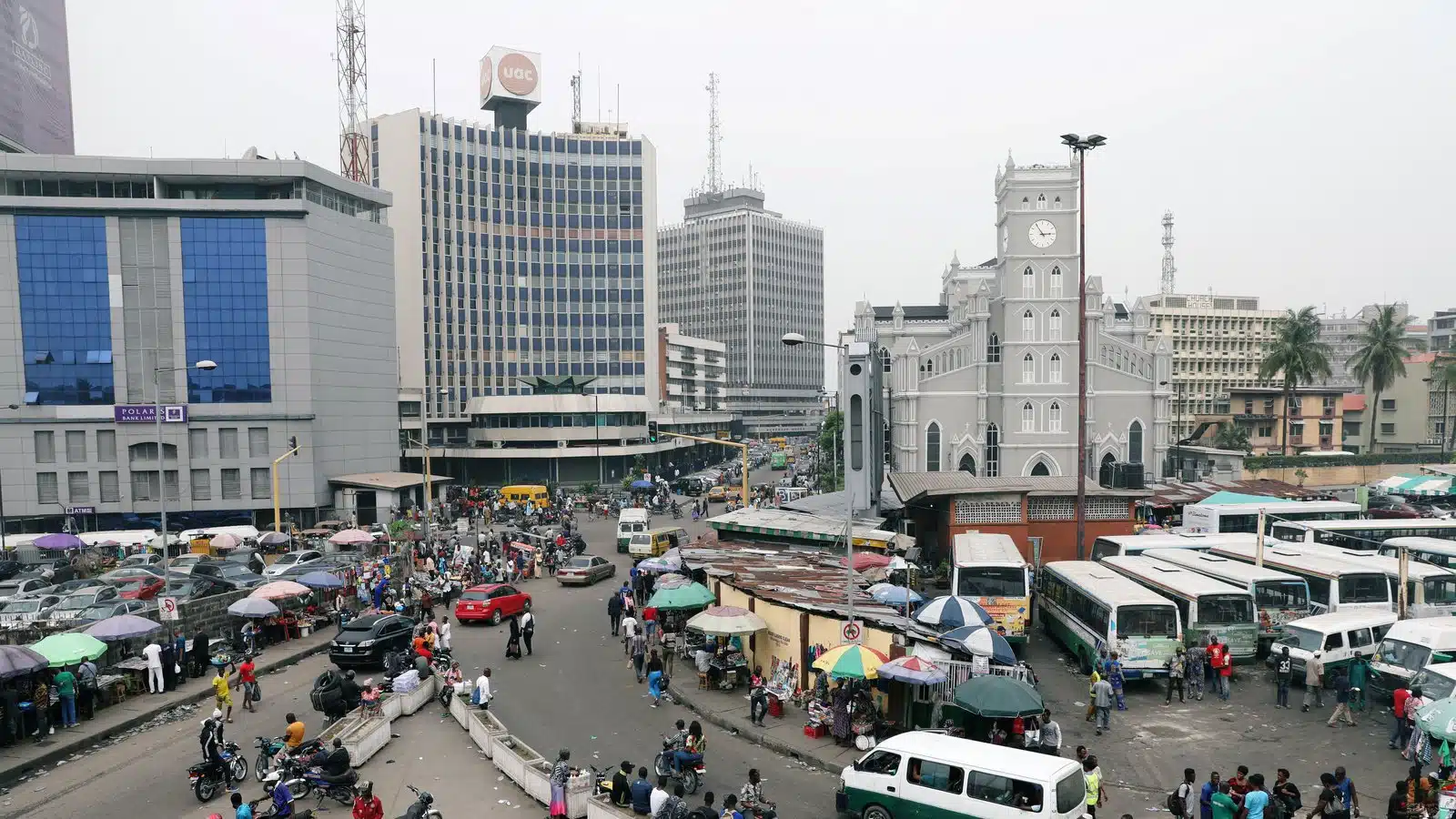
Lagos is Nigeria’s largest city and one of the fastest-growing urban centers in the world. Though no longer the political capital, it’s the country’s financial, cultural, and commercial powerhouse with a population of 17.16 million in the greater metro area.
Lagos contributes over 30% of Nigeria’s GDP and houses major sectors including finance, oil and gas, entertainment, and tech.
- Victoria Island & Ikoyi: Financial hubs where banks, startups, and multinational companies are headquartered.
- Yaba: Often called “Yabacon Valley,” it’s Nigeria’s leading tech cluster and home to companies like Flutterwave and Paystack.
- Port Infrastructure: Lagos handles over 70% of Nigeria’s imports, driven through Apapa Port—though congestion remains a problem.
Urban Living & Realities
Lagos is vibrant but chaotic. The transport system relies heavily on informal buses (“danfos”), though the Blue Line rail (partially launched in 2023) is a long-awaited step toward modern urban transit.
- Housing: High demand and low supply mean real estate is expensive, especially in places like Lekki and Banana Island.
- Cost of Living: Basic monthly expenses for one person average $1,200–$2,000, depending on location and lifestyle.
Power outages are frequent, leading many households and businesses to rely on generators and solar systems. Internet access is strong in central districts, and Lagos has a growing remote work scene, despite infrastructural gaps.
What to Note about Lagos City, Nigeria
✅ Largest entertainment industry in Africa (Nollywood)
✅ Booming startup ecosystem
✅ Diverse, entrepreneurial population
🚫 Traffic congestion is severe
🚫 Inconsistent public services
Lagos is intense, but for entrepreneurs, creatives, and go-getters, it’s often where the real action is.
Fun Fact
Lagos generates around 10,000 metric tonnes of waste daily, yet it’s also home to a booming recycling industry, turning trash into jobs and raw materials.
3. Kigali, Rwanda
Best for Cleanliness & Safety
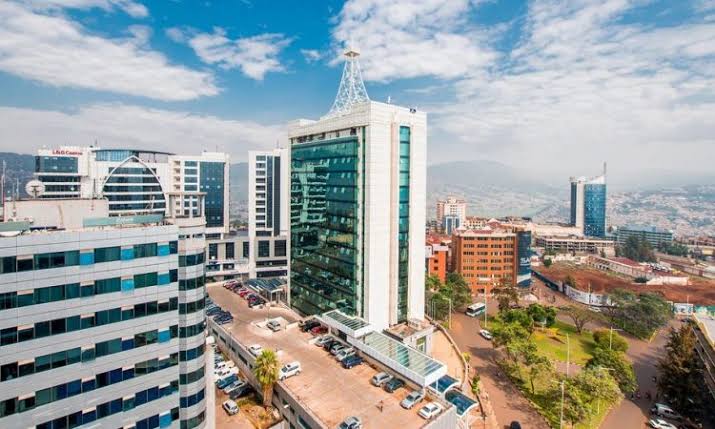
Kigali has quietly built a reputation as one of the cleanest and safest cities not just in Africa, but globally. With a population of 1.33 million, Rwanda’s capital is known for its order, greenery, and rapid digital transformation.
Every last Saturday of the month, the city observes Umuganda—a national cleanup day where citizens join together for community work. It’s not symbolic; it’s cultural, and it’s one reason Kigali’s streets are spotless.
Plastic bags are banned, sidewalks are well-maintained, and public infrastructure is taken seriously. The city also boasts impressive landscaping; lush roundabouts, carefully planned housing zones, and consistent urban zoning.
Growing Tech and Business Scene
Kigali is at the center of Rwanda’s digital ambitions.
- Startup-Friendly: The city hosts the Kigali Innovation City, aiming to be East Africa’s tech hub.
- Visa Access: Citizens from nearly all African countries can get visas on arrival, making Kigali ideal for conferences and business travel.
- Smart City Push: Wi-Fi zones, cashless buses, and smart street lighting are becoming more common.
Kigali International Airport is small but efficient, with a new international airport underway in Bugesera. Transport within the city is mostly via motorbikes (motos) and buses, which are well-regulated.
Pros and Considerations
✅ Extremely low crime rate
✅ Clean, walkable, and well-planned
✅ Strong government support for innovation
🚫 Limited nightlife and entertainment options
🚫 Job market still developing outside of tech and government
Fun Fact
Rwanda aims to become carbon-neutral by 2050, and Kigali is already leading the way with car-free zones, electric motorbike pilots, and green building regulations.
4. Marrakech, Morocco
Best for History & Design
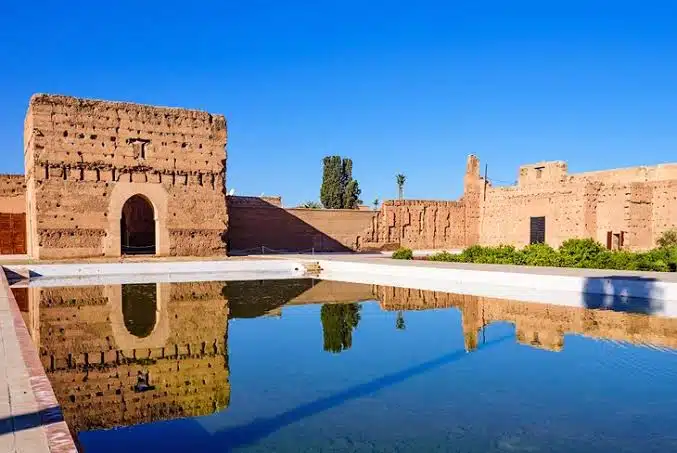
Marrakech, known as the “Red City” for its rose-tinted buildings is a historic and cultural gem nestled at the foot of the Atlas Mountains. With a population of over 1 million, it’s one of Morocco’s top tourist and design destinations, offering a unique blend of tradition, architecture, and modern flair.
Marrakech dates back to the 11th century and still carries its medieval soul.
- The Medina: A UNESCO World Heritage Site, it’s a maze of souks, riads, mosques, and artisan workshops.
- Landmarks: Koutoubia Mosque, Bahia Palace, and Saadian Tombs are just a few of the city’s historic sites.
- Cultural Institutions: The city is also home to the YSL Museum and MACAAL (Museum of African Contemporary Art Al Maaden), signaling a rising influence in the global art world.
A Hub for Design, Tourism, and Wellness
Marrakech is Morocco’s design and hospitality capital.
- Riads & Resorts: Renovated traditional homes turned boutique hotels are a huge draw.
- Events: Hosts the Marrakech International Film Festival and multiple design fairs.
- Wellness: Hammams (traditional bathhouses), yoga retreats, and spas are part of daily life and the tourist offering.
Pros and Considerations
✅ Rich history and striking architecture
✅ Fast-growing luxury and tourism sector
✅ One of Africa’s most walkable cities
🚫 Air quality can be an issue in dry months
🚫 Tourist-driven prices in many areas
Fun Fact
Marrakech is a UNESCO Creative City for Crafts & Folk Art, recognized globally for its centuries-old traditions in leatherwork, metalwork, textiles, and zellige tile design.
5. Nairobi, Kenya
Best for Tech & Wildlife Fusion
Nairobi, often dubbed the “Silicon Savannah,” is a dynamic capital of over 4.5 million people, known for its unique combination of modern innovation and natural beauty. It’s the economic engine of East Africa and a serious player in both tech and conservation.
Nairobi is the heart of Kenya’s digital economy.
- Tech Ecosystem: Home to iHub, Nailab, and the Africa HQs of Google and Microsoft.
- Mobile Money: M-Pesa, Kenya’s revolutionary mobile payment system, was born here—and it transformed global fintech.
- Startups: The city attracts local and international VC funding, particularly in fintech, healthtech, and agritech.
Wild City, Literally
What makes Nairobi unique is that it hosts a national park within the city limits, Nairobi National Park. Lions, giraffes, and zebras roam against a backdrop of skyscrapers.
- Nature Spots: Also home to the Giraffe Centre and David Sheldrick Wildlife Trust.
- Urban Retreats: Places like Karura Forest and Ngong Hills offer hiking and biking just minutes from the CBD.
Cost of Living & Infrastructure
- Transport: Nairobi Expressway (opened 2022) has eased traffic from the airport into the city. Ride-hailing apps like Bolt and Uber are popular.
- Housing: Suburbs like Westlands, Kilimani, and Lavington are expat-friendly but pricey.
- Living Costs: Average single-person budget ranges from $900–$1,800/month, depending on lifestyle.
Pros and Considerations
✅ Major air travel hub in Africa (JKIA)
✅ Thriving tech and entrepreneurial scene
✅ Access to world-class safaris and reserves
🚫 Traffic congestion and air pollution
🚫 Wealth gap visible in housing and services
Fun Fact
Nairobi is the only capital city in the world with a national park inside it, you can literally go on a game drive during lunch break.
6. Accra, Ghana
Best for Culture & Afrobeat Vibes
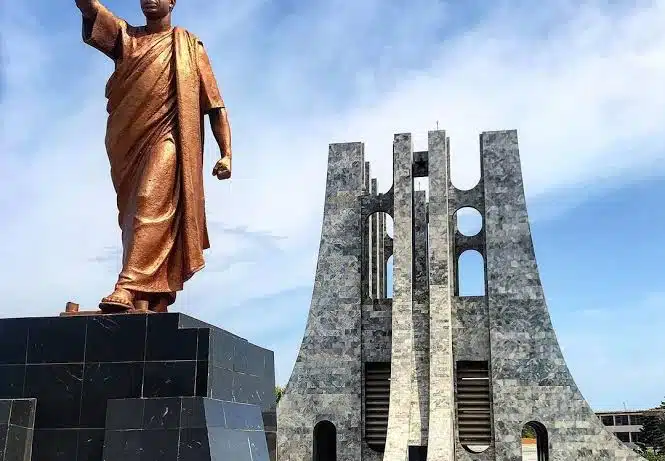
Accra is the heart of Ghana’s political, cultural, and economic life. With a population of around 5.5 million in the Greater Accra Region, it’s one of West Africa’s most welcoming and fast-developing cities. Known for its warmth, rhythm, and growing creative economy, Accra blends traditional values with bold, modern energy.
Ghanaian culture is deeply woven into the city’s rhythm, from food and festivals to fashion and music:
- Music Scene: Accra is a hub for Afrobeat, Highlife, and Hiplife. Artists like Sarkodie, Stonebwoy, and Gyakie call it home.
- Art & Fashion: The city supports a thriving creative industry, with galleries like Nubuke Foundation and events like Chale Wote Street Art Festival drawing global attention.
- Cuisine: Street food is a staple—think waakye, kelewele, and banku—while upscale restaurants are growing in number, especially in Osu and East Legon.
Digital & Economic Growth
Ghana’s stable democracy and rising middle class have made Accra a magnet for remote workers, entrepreneurs, and returnees from the diaspora.
- Tech and Startups: The city is home to MEST Africa and numerous fintech startups.
- Internet & Infrastructure: 4G is widely available, and Ghana was one of the first African countries to adopt digital addressing.
- Housing: Renting in central areas like Cantonments or Airport Residential can be pricey, but more affordable options exist on the city’s outskirts.
Pros and Considerations
✅ Stable political environment
✅ Deep cultural roots and global creative appeal
✅ Welcoming to tourists and diaspora returnees
🚫 Traffic congestion, especially during rush hour
🚫 Waste management and flooding in some low-lying areas
Fun Fact
Accra is the top West African destination for Black diaspora tourism, especially during December’s Year of Return celebrations, drawing thousands for festivals, concerts, and heritage experiences.
7. Cairo, Egypt
Best for Heritage & Urban Living
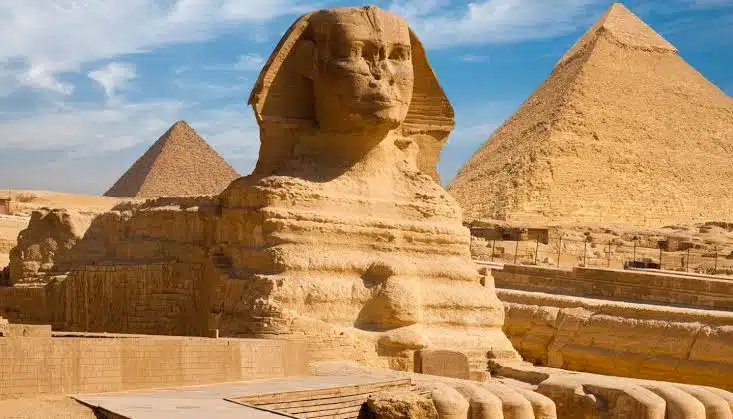
Cairo is a living museum, layered with thousands of years of history and a population of over 20 million people. As Africa’s largest metro area, it offers a dramatic blend of ancient civilization and dense, modern-day urban sprawl.
From Pharaohs to Fatimids, Cairo is a deep dive into human history.
- The Egyptian Museum: Still home to thousands of antiquities, including treasures of Tutankhamun.
- Islamic Cairo: A UNESCO World Heritage Site, featuring mosques, madrassas, and architecture dating back over 1,000 years.
- Giza Pyramids: Just outside the city, they’re still Cairo’s crown jewel—alongside the Sphinx and the long-awaited Grand Egyptian Museum (soft launched in 2023).
A Busy, Bustling Megacity
Cairo is intense, fast-paced, and endlessly stimulating.
- Housing: Popular areas like Zamalek, Maadi, and New Cairo offer calmer, leafy neighborhoods away from the city’s bustle.
- Transport: The metro is one of Africa’s only fully functional underground systems, cheap and efficient. Cairo also introduced its first electric bus routes in recent years.
- Cost of Living: You can live reasonably well on $700–$1,500/month, though prices are rising with inflation and currency shifts.
Cairo is also a media hub, with a huge Arabic-language film and TV industry based there, and an academic center with institutions like the American University in Cairo.
Pros and Considerations
✅ Incomparable historical landmarks
✅ Affordable for long-term stays
✅ Strong expat and student communities
🚫 Air pollution and traffic congestion
🚫 Bureaucratic red tape for business or permits
Fun Fact
Cairo’s Al-Azhar University, founded in 970 AD, is one of the oldest operating universities in the world, predating Oxford by over a century.
8. Dakar, Senegal
Best for Art & Coastal Cool
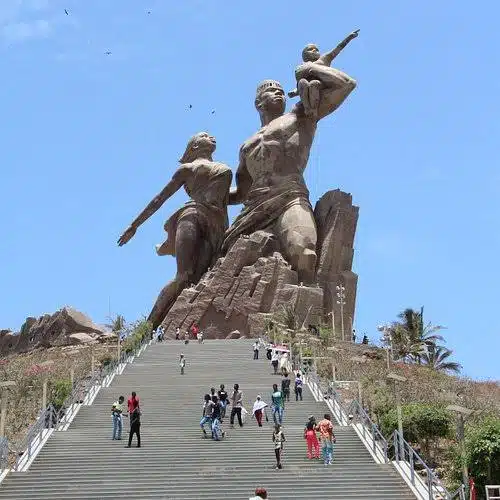
Dakar, perched on the westernmost tip of Africa, is the cultural capital of Francophone West Africa. With a metro population of over 3.5 million, it’s known for its eclectic art scene, breezy Atlantic coastline, and spirited sense of identity.
Dakar has long been a hub for African expression—visual, vocal, and political.
- Art Scene: Home to the Dak’Art Biennale, one of Africa’s largest contemporary art exhibitions. You’ll find both formal galleries and vibrant street murals across the city.
- Live Music: The city pulses with mbalax beats, a genre popularized by global icon Youssou N’Dour.
- Fashion & Design: Dakar Fashion Week and a growing number of local design studios have put the city on the global radar.
Living by the Atlantic
Dakar’s coastal position defines much of its lifestyle.
- Beaches: Ngor, Yoff, and Virage beaches are popular for surfing and socializing.
- Island Getaways: Gorée Island, a UNESCO World Heritage site, is a short ferry ride from the city and offers a sobering yet vital reflection on the transatlantic slave trade.
- Daily Life: Locals balance tradition and modernity—expect a mix of bustling markets, French colonial architecture, and flashy cafés serving attaya (Senegalese mint tea).
Cost & Infrastructure
- Transport: Buses and shared taxis are common, but traffic can be tricky. The new TER commuter rail connects Dakar to outer suburbs and the Blaise Diagne International Airport.
- Living Costs: A single person can live comfortably on $800–$1,500/month, depending on location and lifestyle. Areas like Almadies and Plateau are expat favorites.
Pros and Considerations
✅ One of Africa’s most expressive and welcoming cultures
✅ Beach-city energy with strong community ties
✅ Big art, music, and fashion presence
🚫 French fluency is essential for smooth navigation
🚫 Public services and utilities can be inconsistent
Fun Fact
Dakar is closer to New York City than it is to Addis Ababa! It’s also home to Africa’s tallest statue, the 49-meter African Renaissance Monument which is taller than the Statue of Liberty.
9. Addis Ababa, Ethiopia
Best for Pan-African Spirit
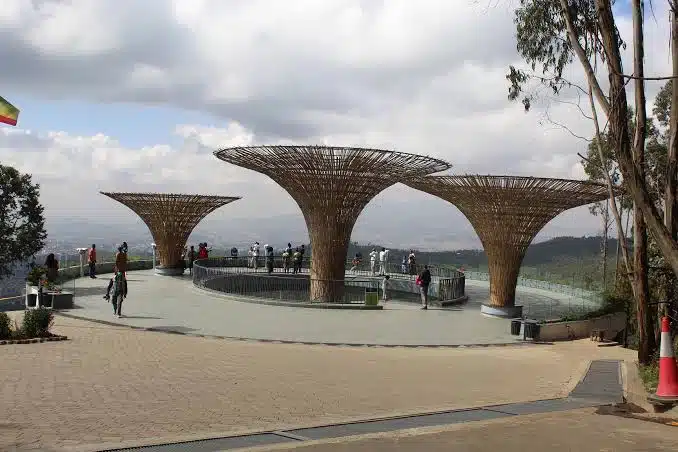
Addis Ababa, meaning “New Flower,” is more than Ethiopia’s capital—it’s the diplomatic capital of Africa. With a population of over 5 million and sitting at an elevation of 2,355 meters (7,726 ft), it’s one of the highest major cities in the world and the political heart of the continent.
Addis is home to the African Union headquarters and the United Nations Economic Commission for Africa (UNECA), making it a hub for global conferences and policy-making.
- Visa Hub: Thanks to its status, Addis offers visa-on-arrival for many African nations and international visitors.
- Bole International Airport: A major aviation hub, especially through Ethiopian Airlines, which connects the continent to Europe, Asia, and the Americas.
A Blend of Ancient & Urban Life
Ethiopia has its own unique calendar, script (Ge’ez), and even time system. Addis captures this heritage alongside rapid modernization.
- Culture & History: The National Museum of Ethiopia houses Lucy, the 3.2-million-year-old hominid. Holy sites, like Holy Trinity Cathedral, sit beside modern cafés.
- Food Scene: Injera, shiro, and rich Ethiopian coffee are staples. Traditional restaurants often pair meals with live dance and music performances.
- Urban Energy: The city is dotted with construction cranes, highways, and new real estate projects. Despite this, Addis retains a deeply communal and spiritual feel.
Pros and Considerations
✅ Strong diplomatic and airline connections
✅ Unique cultural identity not colonized by the West
✅ Affordable cost of living for expats and long stays
🚫 Unpredictable internet and power outages
🚫 Urban infrastructure still catching up to growth
Fun Fact
Addis Ababa is one of only two African cities that was never colonized (alongside Liberia’s Monrovia). It also runs on the Ethiopian calendar, which is about 7–8 years behind the Gregorian one—so in Addis, it’s still 2017!
10. Port Louis, Mauritius
Best for Remote Work & Luxury Living
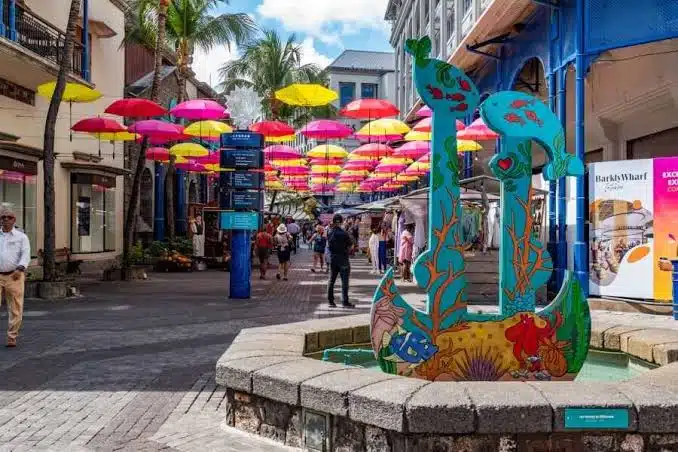
Tucked away in the Indian Ocean, Port Louis is the capital of Mauritius, a small island nation that punches way above its weight. With a population of just 150,000 in the city proper (and around 1.3 million nationwide), it offers a rare combo of economic stability, tropical beauty, and digital-friendly policies.
Port Louis is a mix of colonial charm, financial hustle, and mountain-framed skylines.
- Economic Hub: It’s home to major banks, insurance firms, and the Mauritius Freeport, a bustling logistics and trade zone.
- Cultural Blend: Influences from Africa, India, China, and Europe give the city a multi-layered cultural and culinary identity. Temples, mosques, and French colonial buildings coexist peacefully.
- Safety & Cleanliness: Mauritius consistently ranks among Africa’s safest and most peaceful countries, with low crime and political stability.
Built for Remote Workers & Entrepreneurs
- Digital Nomad Visa: Mauritius offers a Premium Visa, allowing remote workers to live and work on the island for up to a year. While income earned from outside Mauritius is generally not taxed locally, applicants must meet a minimum income or savings requirement and should consult a tax advisor for their specific situation.
- Connectivity: High-speed fiber is available, especially in business districts and serviced apartments.
- Co-working Spaces: Emerging hubs like The Hive and Officea cater to the remote crowd.
Cost of Living & Lifestyle
- Living Costs: Higher than mainland Africa but reasonable by global island standards. Expect $1,200–$2,500/month depending on lifestyle.
- Things to Do: Sailing, diving, hiking in Black River Gorges, weekend resort getaways—there’s no shortage of “out of office” adventures.
Pros and Considerations
✅ Visa-friendly for remote workers and expats
✅ Tropical climate and high quality of life
✅ Safe, clean, and politically stable
🚫 Small local market—not ideal for every kind of business
🚫 Public transport is limited outside urban cores
Fun Fact
Mauritius was once home to the dodo, the famously extinct bird, and it’s now aiming to be a tech and financial hub, sometimes called the “Singapore of Africa.”
Quick recap: 10 best cities in Africa (2025 edition)
| City | Country | Best For | Highlight |
| Cape Town | South Africa | Lifestyle & Scenery | Table Mountain, coastal living, and wine country charm |
| Lagos | Nigeria | Business & Hustle Culture | Africa’s largest economy and startup capital |
| Kigali | Rwanda | Cleanliness & Safety | Impeccable order, safety, and innovation-friendly policies |
| Marrakech | Morocco | History & Design | Ancient medinas meet high-end riads and design aesthetics |
| Nairobi | Kenya | Tech & Wildlife Fusion | Safaris + startups = Silicon Savannah |
| Accra | Ghana | Culture & Afrobeat Vibes | Youthful energy, music, and cultural pride |
| Cairo | Egypt | Heritage & Urban Living | From pharaohs to fast-paced modern life |
| Dakar | Senegal | Art & Coastal Cool | Music, murals, fashion, and waves |
| Addis Ababa | Ethiopia | Pan-African Spirit | Home of the AU and ancient-meets-modern cultural flair |
| Port Louis | Mauritius | Remote Work & Luxury Living | Island life meets digital nomad heaven |
Final thoughts
Africa is a mosaic of movement, creativity, business, and bold visions of the future. From Cape Town’s postcard-perfect landscapes to Nairobi’s tech labs and Dakar’s creative heartbeat, these cities are leading.
This list doesn’t aim to crown a “best overall,” but to spotlight the uniqueness of different cities. So wherever you’re headed, whether virtual or IRL, Africa’s cities are ready to welcome you with something fresh, real, and powerful.
Ready to pack your bags?

